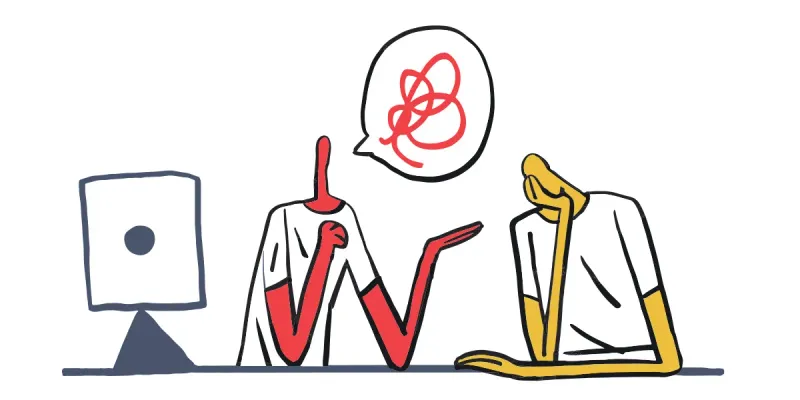16 Ways Strict Upbringing Trains Kids For Obedience—Not Leadership
Authoritarian parenting, characterized by high demands and low responsiveness, often prioritizes obedience and conformity over individual growth and critical thinking.
This traditional style of parenting shapes children into obedient adults who may excel in white-collar environments but at the cost of creativity, independence, and emotional resilience.
This blog explores how such an upbringing molds professional identities and impacts workplace behavior, creating a workforce that is highly compliant but lacks initiative.
Each of the 16 items presented below delves into a different aspect of this conditioning, offering insights into the lasting consequences of authoritarian upbringing on modern professional life.
1. They Prioritize Obedience Over Critical Thinking

Obedience is often mistaken for virtue in authoritarian households. While following rules is important, critical thinking is what drives progress. Children raised under strict rules often lack the ability to question and critique. In professional settings, this leads to a workforce that excels at meeting targets but struggles with innovation.
They become specialists in enforcement rather than creators of value. Such environments breed mediocrity, as employees are less likely to challenge the status quo. The result? An office culture that prizes obedience over excellence, leaving little room for groundbreaking ideas.
2. They Fear Authority—Even When It’s Abusive

Growing up under the shadow of authoritarian parents instills a deep-seated fear of authority figures. This fear persists into adulthood, making individuals reluctant to question or confront leaders, even when they are abusive. In the workplace, this manifests as employees enduring toxic environments without raising concerns.
They fear repercussions more than the toxicity, creating a vicious cycle of silence and complacency. While they may be seen as model employees, the truth is they are prisoners of their conditioning, unable to break free from the chains of fear and submission.
3. They Seek Approval Before Trusting Their Instincts

In households where validation comes only through obedience, children learn to seek approval before trusting their own instincts. This habit carries over into their professional lives, where they become overly dependent on supervisors for validation. Such individuals hesitate to make independent decisions, fearing disapproval.
This can stifle innovation and slow down processes that require quick, decisive action. Instead of trusting their well-honed instincts, they become caught in a loop of seeking constant reassurance. This behavior can lead to a stagnant work environment where innovation is rare, and progress is slow.
4. They Hesitate to Speak Up in Meetings

Raised to believe that silence is golden, many children from authoritarian backgrounds grow up hesitant to voice their opinions. In meetings, this translates to a reluctance to speak up, even when they have valuable insights. The fear of stepping out of line often outweighs the potential benefits of contributing.
This creates a workplace culture where ideas are not shared, and collaboration is stifled. Such environments miss out on the diverse perspectives that foster creativity and innovation. Hesitation to speak up not only limits individual growth but also impedes organizational progress.
5. They Apologize for Asking Questions

In strict households, curiosity is often mistaken for defiance. As a result, children learn to apologize for asking questions. In the workplace, this manifests as employees who feel the need to preface inquiries with apologies. While questions are essential for understanding and growth, these individuals fear being perceived as challenging authority.
This behavior stifles learning and can lead to misunderstandings and errors. By treating questions as disruptions, authoritarian upbringing hinders the natural curiosity that drives improvement and innovation. Apologies become a way to shield themselves from imagined reproach.
6. They Follow Directions—Without Questioning Outcomes

Authoritarian parents emphasize adherence to rules, teaching their children to follow directions without questioning the outcomes. This creates adults who excel at executing tasks but lack the initiative to assess the bigger picture. In professional settings, these individuals become reliable but uninspired employees, doing as they are told without considering potential improvements.
This mindset perpetuates inefficiencies and stalls innovation. The inability to question outcomes means that projects often proceed without critical evaluation, ultimately hindering the company’s growth and adaptability in a rapidly changing world.
7. They Avoid Confrontation at All Costs

Raised in environments where dissent was discouraged, these individuals grow into adults who shun confrontation. They prioritize harmony over conflict, even when disagreement could lead to better solutions. In the workplace, this means important issues often go unaddressed, as employees avoid uncomfortable conversations.
The fear of confrontation can lead to unresolved tensions, affecting team dynamics and productivity. By avoiding confrontation, these individuals miss opportunities for constructive conflict, which can drive innovation and improvement. The desire for peace keeps them from challenging the status quo.
8. They Need External Validation to Feel Secure

In households where affirmation is conditional, children learn to rely on external validation to feel secure. This dependency continues into adulthood, where they seek constant feedback to gauge their worth. In the workplace, this results in employees who are more concerned with pleasing superiors than pursuing genuine excellence.
They may prioritize tasks that earn immediate praise over those that contribute long-term value. This creates a work culture focused on short-term rewards, where genuine innovation takes a backseat to immediate approval. The need for external validation becomes a barrier to self-assurance and autonomy.
9. They Second-Guess Every Decision

Growing up in an environment where mistakes were met with criticism, these individuals learn to second-guess their decisions. This habit persists into their professional lives, where they struggle with self-doubt. Constantly questioning their choices, they find it difficult to make decisive moves.
This can lead to paralysis by analysis, where tasks take longer than necessary due to endless deliberation. In a fast-paced work environment, this hesitation can be detrimental. By second-guessing every decision, they undermine their potential, limiting both personal and organizational growth.
10. They Overwork to Earn Worth

In authoritarian households, worth is often tied to achievement. This results in individuals who feel compelled to overwork to prove their value. They equate long hours with dedication, often at the expense of their well-being. In the corporate world, this translates into employees who burn the midnight oil to meet perceived expectations.
While they may be seen as dedicated, their excessive workload often leads to burnout. This cycle of overworking is unsustainable and can lead to diminished productivity over time. It’s a costly pursuit of approval that overlooks the importance of balance and self-care.
11. They Avoid Leadership Roles, Even if Qualified

Raised to value compliance over initiative, these individuals often shy away from leadership roles, even when qualified. They are conditioned to believe that stepping into the spotlight invites scrutiny and criticism. The fear of failure and judgement outweighs their ambition, leading them to decline opportunities for advancement.
This reluctance keeps them in the shadows, where they may excel as team players but never as leaders. Their potential remains untapped, depriving organizations of capable leaders who can drive change and inspire growth. It’s a silent resignation to mediocrity.
12. They Hide Emotions to Appear “Professional”

In many authoritarian households, emotional expression is seen as a weakness. Children learn to suppress their feelings to appear strong and capable. This conditioning carries over into their professional lives, where they hide emotions to maintain a façade of professionalism. While stoicism is often valued in the corporate world, it can lead to a lack of authenticity and disconnected relationships.
By concealing emotions, these individuals miss opportunities for genuine connection and understanding with colleagues. This leads to an environment where empathy is scarce, and collaboration suffers.
13. They Assume Their Ideas Aren’t Good Enough

Conditioned to doubt their own ideas, these individuals often assume their contributions lack value. This self-doubt stifles creativity and discourages them from sharing insights that could drive innovation. In professional settings, this translates into a reluctance to pitch ideas, even when they have the potential to make significant improvements.
The fear of rejection and failure keeps them from participating fully in creative processes. Their silence deprives the team of diverse perspectives that could lead to breakthrough solutions. It’s a cycle of undervaluing one’s potential that limits growth and progress.
14. They Tolerate Toxic Work Cultures

Accustomed to environments where negativity is normalized, these individuals often tolerate toxic work cultures. They perceive dysfunction as an expected part of professional life, rather than something that should be challenged. In such settings, they endure poor management and hostile coworkers without voicing concerns.
This acceptance of toxicity perpetuates a harmful work environment where morale and productivity suffer. By tolerating the intolerable, they contribute to the continuation of detrimental practices. It’s a resignation to adversity that overlooks the possibility of positive change and healthy working conditions.
15. They Equate Being Liked with Being Valuable

In authoritarian households, approval is often equated with love. This belief follows individuals into their professional lives, where they equate being liked with being valuable. They prioritize pleasing others over asserting themselves, often at the cost of their own needs and opinions.
In the workplace, this manifests as a tendency to agree with the majority, even when they disagree. By seeking to be liked, they sacrifice authenticity and personal growth. This behavior leads to a lack of genuine connections and stifles diversity of thought. It’s a misguided pursuit of acceptance that hinders true value creation.
16. They Measure Success by Not “Rocking the Boat”

For individuals raised in authoritarian settings, success is often measured by how well they conform. They learn that not “rocking the boat” earns them approval, a lesson that persists in their professional lives. In the workplace, they avoid taking risks or challenging the norm, believing that stability equates to success. This mindset limits innovation and discourages questioning the status quo.
By prioritizing conformity over creativity, they miss opportunities to make impactful changes. It’s a stifling adherence to tradition that values complacency over progress, ultimately hindering both personal and organizational growth.







